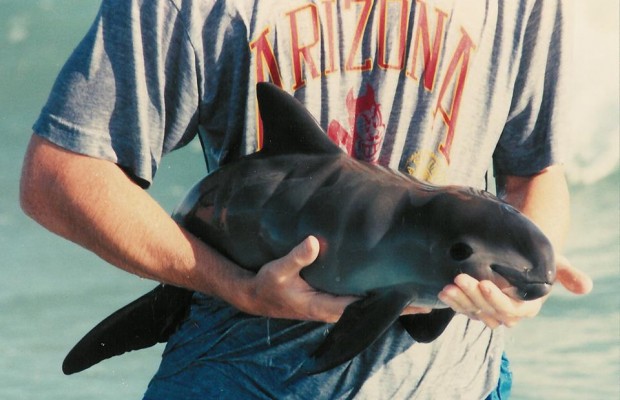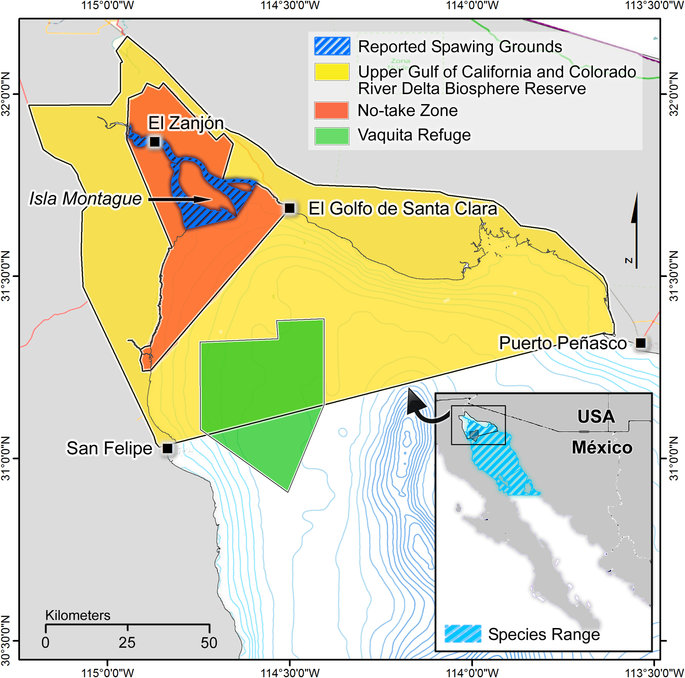By José Antonio Pérez
Specialists of the World Wildlife Fund (WWF) warn only weeks separate the vaquita marina (Phocoena sinus) from survival or extinction. This is the period that remains in the temporary ban by the Mexican government on the use of gillnets, principal threat to the vaquita marina, by fishermen in the Gulf of California. It is believed there are only about 30 vaquita that currently remain.
With this in mind, Jorge Rickards, acting CEO of WWF-Mexico, led a press conference asking authorities to make the net ban permanent given the species’ decline. He furthered that recently they have come across deceased vaquitas trapped in illegal nets.
WWF Mexico has presented an analysis entitled “Extinction of the Vaquita: Saving the most threatened sea mammal in the world,” announcing the formal launch of a campaign aimed at saving the small mammal from extinction. The campaign has already received support across the social networks of actor Leonardo DiCaprio.
Rickards and his team stated the Secretary of the Environment and Natural Resources (SEMARNAT) has announced its economic support for the CPR Vaquita Project (Conservation, Protection, and Recovery). This implies protecting the mammal in a semi-captive environment along with a program of artificial reproduction.
The program, promoted by the International Committee for the Recovery of the Vaquita Marina (CIRVA), consists in finding and moving individual vaquita to a temporary sanctuary with the goal of ensuring its reproduction while preventing the risk of getting caught in nets used in the illegal fishing of totoaba.
“Our position is to work with, and make data available, while requesting greater action from all involved. With respect to CIRVA, we are in agreement, though we see this as a desperate measure involving high risks as this has never been done with this species; however, it must be done along with removal of ghost nets so that the wild population may survive,” commented Rickards.
María José Villanueva Noriega, Adjunct Director of Strategy and Science for WWF-Mexico, as well as Enrique Sanjurjo, WWF Development Coordinator, accompanied Rickards and explained it is also urgent to work with fishermen so they use alternative fishing methods that do not imply use of nets in which the vaquita marina can be caught.
“There are many people involved within the communities, however this determination must transform into public policy,” stated Enrique Sanjurjo.
“Scientists have told us, at this rate of decline, if we do not do something the vaquita could be lost before the (Mexican) elections of 2018,” emphasized Villanueva Noriega.
In speaking to the Scientific and Technology Advisory Forum, the researcher highlighted the already existing reserve in the Upper Gulf of California and Rio Colorado Delta. In 2015 the protected area was extended, along with a temporary ban on the use of gillnets. This ban expires at the end of May, 2017.
Among direct actions carried out by WWF specialists is that of supporting the removal of ghost nets. The researcher added so far during 2017 they have come across 15 gillnets, which makes them believe there are even more in the region.
Although the official figure is that 30 vaquita remain in the Gulf of California, the finding of at least six deceased vaquita this year, along with others last year, makes specialists fear the situation is even more dire than had been thought. Therefore, from June to August this year a new vaquita census will be taken through use of acoustic and visual searches in an effort to determine the present state of the endangered species.
The vaquita, which is endemic to Mexico, extends across a 40,000 square kilometer area, and can reach up to 150 centimeters in length and weigh up to 50 kilograms. Their reproductive cycle is that of only one young every two years.
It is worth noting, details the Porpoise Conservation Society, the first Saturday after the 4th of July has been designated as International Save the Vaquita Day, or rather July 8th, 2017. This is intended to be an annual event with a specific focus on raising awareness and appreciation of the world’s most endangered marine mammal.

